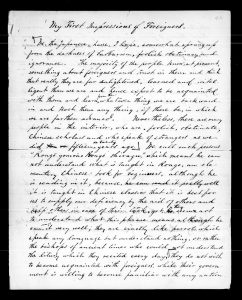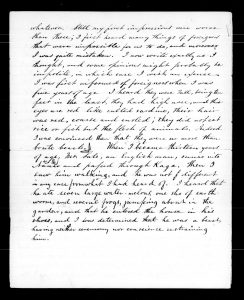Unsigned


My First Impressions of Foreigners
(Transcribed by Isabella Bonvini and Devin Busono)
We, the Japanese have, I hope, somewhat sprung up from the darkness of barbarism, foolish obstinacy, and ignorance. The majority of the people know, at present, something about foreigners and trust in them and think that really they are far enlightened, learned, and intelligent than we are and hence expect to be acquainted with them and learn from them whatever thing we are backward in and teach them anything, if there be, in which we are farther advanced. Nevertheless, there are many people in the interior, who are foolish, obstinate, Chinese scholars, and who speak of strangers as we did fifteen or twenty years ago. We call such persons “Rongo yomino Rongo shirazu,” which means he can not understand what is taught in Rongo, an elementary Chinese book for beginners, although he is reading in it, because, it is taught in Chinese classics that it is best for us to supply our deficiency by the aid of others and help others in case of their lack, yet they seem not to understand what this phrase means although he can read it very well; they are exactly like parrots which speak any language but understand nothing, or rather the bishops of ancient times who could not understand the liturgy which they recited every day. They do not wish to become acquainted with foreigners, while their government is willing to become familiar with any nation whatever. Still, my first impressions were worse than these; I first heard many things of foreigners that were impossible for us to do, and moreover, I was quite mistaken. I now write exactly as I thought, and some opinions might probably be impolite, in which case I wish an excuse. I was first informed of foreigners when I was five years of age. I heard they were tall, being ten feet in the least, they had high nose, and their eyes were red like salted sardine, their hair was red, coarse and curled; they did not eat rice or fish, but the flesh of animals. Indeed, I was convinced then that they were no more than brute beasts. When I became thirteen years of age, Mr. Sato, an English man, came into Nanao and passed through Kaga. Then I saw him walking, and he was not different in any case from what I had heard of. I heard that he ate seven large watermelons, one sho of earthworms, and several frogs, jumping about in the garden, and that he entered the house in his shoes, and I was determined that he was a beast, having neither ceremony nor conscience restraining him.
-
This essay displays a very clear and stark contrast between how the Japanese viewed foreigners before and after first interacting with them. Unknown recounted being told of how impressive the foreigners were; it was believed that they were far more enlightened than the Japanese, and he was told rumors of their foreboding physical appearance. While he reported that the latter remained true, he found that Western intelligence was lacking. One of the goals of Japanese Westernization and modernization was for there to be an exchange of knowledge. Westerners were expected to teach the Japanese of the many things they could not yet fathom, and the Japanese were to return the favor, if there was any need for it. Enlightenment and education were among the many things promised to the Japanese by the foreigners, and some, like Uknown, were unconvinced.
Instead of impressive scholars, Unknown wrote of brutish, beastly Western men, whose massive figures and disregard for etiquette made them difficult to bear. They ate the meat of animals and entered homes without taking off their shoes, and he considered this the distasteful behavior of men without “ceremony nor conscience” (Unknown). Unknown’s opinion is reflective of a rather common thought shared by the Japanese at the time: although the Westerners were impressive and had a lot to share in terms of Japan’s betterment, they were materialistic, lacked morals, and were generally inferior.
There were even scholars within the Japanese government who shared Unknown’s opinions to a more extreme extent. This group of Chinese scholars did not want to have any relationship with foreigners at all. They considered foreigners to be too simple-minded to even comprehend the most elementary Chinese book for beginners. However, Unknown argued that they did not quite understand the teachings of their own methodology, which stated that it was best to ask others for help when necessary, and to return the favor so there could be mutual growth and understanding.
His begrudging acceptance of Western presence in Japan defines Unknown’s first impressions of foreigners, and provides an interesting insight on the contrasting beliefs Westerners and the Japanese held, both socially and educationally.
-
In this essay, Griffis’ student references the general consensus of the Japanese community that ideals from the West encapsulated enlightenment and intelligence that could benefit Japan. He notes that there was, however, a small group of Chinese scholars that had not yet moved on from the barbarianism of the Edo period, partly because the group ridiculed the efforts of Westerners to learn Chinese. Ironically, these Chinese scholars are taught that they should be helping those who seek to fill their deficiencies, demonstrating the stark hypocrisy of many gate-keeping, nationalistic government officials at the time. The student remarks that despite the Japanese government’s willingness to open the doors of the country to modernization from the West as it transitioned into the Meiji Period, the stubborn views of a few xenophobic nationalists persisted, hindering the advancement of Japan.
In spite of this, the student maintains a poor first impression of Westerners. He writes regarding his disillusionment with the ideal enlightenment of the West that many Japanese revered with admiring eyes; instead, he calls out Westerners for exhibiting the same barbaric tendencies (if not worse) as the “once-ignorant” Japanese of the pre-Meiji Era. Though he heard that Westerners were able to do a plethora of things that were impossible for the Japanese, he claims that a few encounters with Westerners was enough to disprove that, showing how quick he is to judge them. A point of interest is the student’s focus on the physical/tangible differences between the Japanese and Westerners. Though earlier in the essay he implies that the ethics and education of the two cultures were among the greatest differences between Japan and the West, he does not mention this in the latter half, instead choosing to shine a negative light on the appearances and diets of the Westerners in an effort to underscore just how “brute” these “beasts” were. Though this student’s first impression of foreigners contains support for and criticism of the West, it aptly illustrates how divided the Japanese were over the dissemination of Western culture in Japanese tradition.